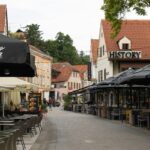ZAGREB, November 5, 2019 – Regardless of the outcome of Brexit, the current announcements from British market partners show that the number of British tourists visiting Croatia in 2020 could be the same as this year and anything more would be a step forward, Tourism Minister Gari Cappelli said on Monday, the first day of the World Travel Market in London.
The 40th WTM is taking place on November 4-6 and the first day focused on Brexit, its uncertain outcome and its possible consequences for tourism in the UK and the many countries Britons visit.
“Croatia is an already recognisable destination which Britons like to visit, more and more of them every year, and although we can’t yet be sure what 2020 will be like on that market, we are confident the results will be the same as this year when, by early November, close to 900,000 of their tourists arrived, generating 4.5 million nights. Those are growths of 4% and 3% in relation to 2018,” Cappelli said.
He said the tourism ministers of Greece, Albania, Cyprus and Portugal, with whom he talked at the WTM, as well as UK Parliamentary Under-Secretary of Tourism Helen Whately, shared those thoughts.
After visiting the Croatian stand and talking with Cappelli and National Tourist Board director Kristjan Staničić, she said cooperation in everything remained very important.
Brexit makes tourist deals and travel a little uncertain, but we are not that concerned because we see that partners from the world want to continue to work with us. Also, regardless of the outcome, we want to continue the close long-term cooperation also with partners in the EU, in which Croatia is certainly important, Whately said.
Cappelli and Staničić said new five-year contracts were signed at the WTM with British airline EasyJet to increase the number of flights to Croatia as of next year, including a contract with Pula Airport.
Pula Airport director Svemir Radmilo and EasyJet’s UK manager Nail Slaven said the contract was excellent for both sides and that they expected the number of passengers to increase from the current 150,000 to 250,000.
That will benefit not only the City of Pula and Istria County but other destinations in Croatia as well, said Radmilo.
He said market research showed that Britons were satisfied with the price-quality ratio in Croatian tourism, but added that it was necessary to continue to innovate and raise product quality, notably in segments important to Britons such as boating, gastronomy and culture.
More news about Croatian tourism can be found in the Travel section.







